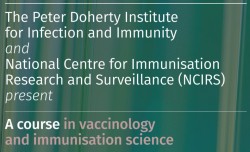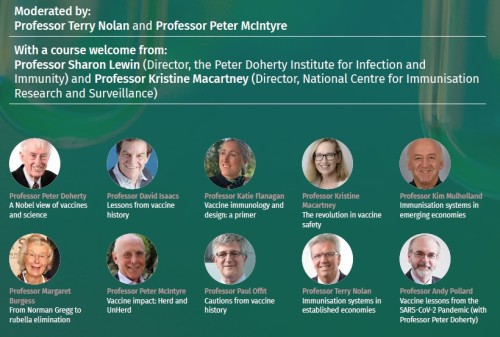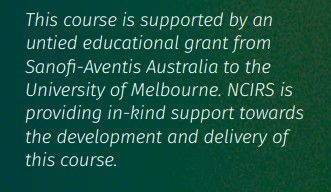Who controls vaccination education?
7th January 2022

(Screenshot taken from the course material [2])
Over the years, we have exposed serious conflicts of interest (COI) in the formulation of vaccination policies in this country (1). We have discovered that a new online course to educate the public on vaccination and its science [2] is being delivered by the very individuals and organisations that receive funding from vaccine manufacturers.
We of the Informed Medical Options Party find this extremely disturbing. We consider it our duty to inform the public of the serious issues within our government health departments, and to identify those who influence and control vaccination policies, as per our detailed COI press release [1]. None of the COI information below is mentioned in the advertisement for the course.
For example:
The Vaccine and Immunisation Research Group (VIRGo) advises government on vaccination policy and vaccine use. It is a collaboration between The Peter Doherty Institute and The Murdoch Children’s Research Group. VIRGo has received funds from vaccine manufacturers GSK, Janssen, Merck, Novavax, Sanofi and Sequiris.
The National Centre for Immunisation Research and Surveillance (NCIRS) disclosed in 2016 that its clinical research group undertakes a mix of investigator driven and industry sponsored research, including studies supported by vaccine manufacturers. Many members of their advisory board also has conflicts of interest.
Module 1 of this course is moderated by Prof. Terry Nolan and Prof. Peter McIntyre.
Prof. Terry Nolan is currently head of the Vaccination and Immunisation Research Group (VIRGo), which he established in the 1990s at the Murdoch Children’s Research Institute. VIRGo has received funding from vaccine manufacturers GSK, Janssen, Merck, Novavax, Sanofi and Sequiris.
In 2009, during his employment with the Australian Technical Advisory Group on Immunisation (ATAGI), Prof Nolan was the lead investigator on the CSL-funded Panvax (monovalent H1N1) influenza vaccine trial conducted on 400 children. He was also on the CSL Limited vaccine advisory board.
In 2009, CSL was given a $131 million federal government contract to produce the nation's entire stockpile of swine flu vaccine, half of which had to be destroyed when it passed its use-by date.
In 2010, CSL’s Fluvax (trivalent) Influenza vaccine was suspended for use in children six months to five years of age, due to a marked increase in febrile reactions following vaccination. The TGA’s epidemiological investigation into that seasonal flu vaccine debacle was led by Prof. Nolan and Prof. Peter Richmond, who were both on CSL’s advisory board.
In 2010, Prof Nolan published a report titled ‘The Australian model of immunisation advice and vaccine funding’, wherein he stated (in respect of conflicts of interest), “involvement in industry-sponsored vaccine research where payment is made to an institution and not to the individual is generally not considered a conflict requiring exclusion.” [!]
Prof. Peter McIntyre, formerly Director of NCIRS (2005–2017), was associated with industry-sponsored vaccine research. The 2015 ATAGI Declarations of Interest document stated that Prof. McIntyre was associated with grant funding from GSK, Pfizer, Merck, National Health and Medical Research Council and ARC.

(Screenshot taken from the course material [2])
Prof. David Isaacs was a member of the government's Pharmaceutical Benefits Advisory Committee (PBAC). The Pharmaceutical Benefits Scheme (PBS) schedule lists all of the medicines available to be dispensed to patients at a government-subsidised price. The PBS/PBAC receives funds from cost recovery fees and charges from vaccine manufacturers. During the period of Prof. Isaacs' PBAC membership, he was co-author of the British Medical Journal article, ‘Introducing a new group B meningococcus vaccine.’
In the last 10 years, Prof. Katie Flanagan has been involved in research projects awarded in excess of AU$30 million, which includes grants from NHMRC and the Bill and Melinda Gates Foundation. She was a presenter at a number of conferences on clinical infectious diseases sponsored by vaccine manufacturer Pfizer.
Prof. Kristine Macartney is Director of the National Centre for Immunisation Research and Surveillance (NCIRS). She presented at an international vaccine conference, for which her travel was sponsored. She is also a member of many ATAGI Working Groups including COVID-19 Working Group, which provides advice to the Minister for Health on the immunisation program for COVID-19 vaccines as they become available in Australia.
Prof. Andrew Pollard is one of the lead developers of the AstraZeneca/Oxford COVID-19 vaccine and yet he is also the Chief Investigator for the conduct of the trials. He was also Chief Investigator of the Bexsero meningococcal B vaccine trials, previously owned by Novartis and now owned by GSK. He is Chair of the Joint Committee on Vaccination and Immunisation (JCVI), which advises U.K. health departments on immunisation; Director of the Oxford Vaccine Group (OVG), which received funding from vaccine manufacturers for their trials; Professor of Paediatric Infection and Immunity at the University of Oxford, which has significant financial influence from the U.K. Vaccine Manufacturing and Innovation Centre and past chair of the European Medicines Agency’s Scientific Advisory Group on Vaccines (SAG-V), Like the TGA and PBS in Australia, the European Medicines Agency levies cost recovery fees and charges on the pharmaceutical industry – one of its main stakeholders.

(Screenshot taken from the course material [2])
References:
